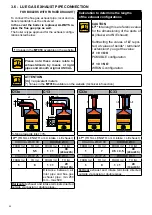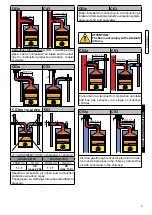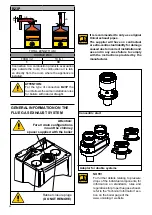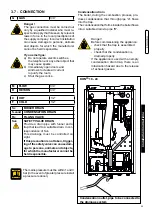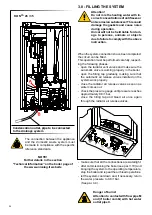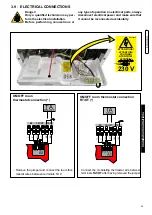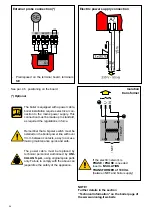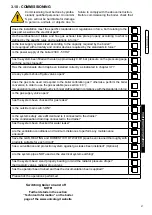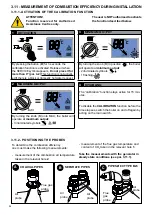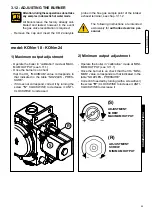
34
ROUTINE YEARLY VERIFICATION OPERATIONS
COMPONENT:
VERIFY:
CONTROL/INTERVENTION
METHOD:
FL
(domestic hot water
priority flow switch
( 2 )
Is the minimum domestic hot water
flow rate 3 l/min.?
The burner must ignite with an
intake above or equal to: 3 l/min.
VG
(Gas valve)
( 3 )
Does the valve modulate properly?
Open a hot water tap at maxi-
mum flow rate and then at min
-
imum. Make sure that the flame
modulates.
SR (heating sensor)
( 11 )
SS (domestic hot water sensor)
( 1 )
SSR (return sensor)
( 22 )
Do the sensors maintain the
original characteristics?
12571 ohm at 20° C / 1762 ohm
at 70° C.
Measurement to be taken with
the wires disconnected (see
table Res/Temp).
E ACC/RIV. (ignition/detection
electrode)
( 4 )
Does the discharge of sparks before
putting the boiler in safe conditions last
less than 10 sec.?
Detach the electrode ionisation
wire and check the securing
time.
TL (anti-overheating
limit thermostat)
( 10 )
Does the TL put the boiler in safety
conditions when overheating?
Heat the TL until it intervenes
at 95°C and check that it inter-
venes at 95°.
DK (safety pressure switch
against water deficiency)
( 13 )
Does the pressure switch block the
boiler
if the water pressure is below 0.4 bar?
Without request: close the shut-
off valves of the heating circuit,
open the drain valve to make the
water pressure decrease. Before
pressurising again, check the
pressure of the expansion vessel.
Expansion vessel
( 8 )
Does the vessel contain the right
amount
of air?
Check the pressure in expansion
vessel (1 bar when the boiler
is empty). Pressurise the boiler
(open the pump automatic vent
valve). Open the heating circuit
closing valves.
Condensation drain trap
(26)
Has the trap got deposits on the
bottom?
Clean the trap with water.
Domestic hot water flow rate
Filter in cold water inlet
( 2 )
Clean the filter with limescale
remover.
Heat exchanger body
(24 )
1) Measure the Thermal Capacity
using a meter and compare the val
-
ue with that contained in table 3.12.
The data measured indicates if the
exchanger needs cleaning.
2) Check that the space between
the rungs of the exchanger are not
clogged
It is recommended to use the
products purposely created by
Unical (see system protection
ACCESSORIES sect. in the
domestic price list), being care-
ful to wash the area with most
rungs first (lowest part visible
from above) and then the upper
part if necessary.
Burner
( 5 )
Check the state of cleanliness of the
burner mesh
Remove any deposits using
compressed air, blowing from
the mesh side.
( Num ) =
see key Par. 2.2

